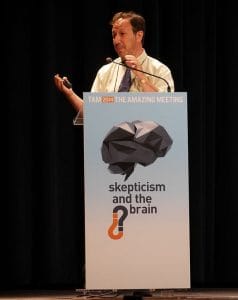Growing up in New York City, Lilienfeld was interested in physical science, but something really caught his attention. “Although my love for natural science never waned,” he said, “I eventually fell in love with the mysteries of the internal world — the human mind — even more than those of the external world.” After receiving his doctorate in psychology, he refused to narrow down and specialize, preferring to be known as a psychological generalist: “This breadth makes me a better researcher and thinker.” He had interest in personality disorders, dissociative disorders, personality assessment, anxiety disorders, psychiatric classification, psychiatric pseudoscience, and evidence-based practices in clinical psychology.

That led Lilienfeld into teaching, spending most of his career at Emory University. He said rationality and critical thinking are “not natural to the human species,” but to “some degree” they can be taught, and noted a person can be completely rational in one area and very irrational in others. “I see science in many ways as a set of safeguards against confirmation bias,” he said, and “It’s up to the scientific community … to hold [scientists’] feet to the fire and make sure that their confirmation bias does not get in the way of their corroborating their own hypotheses.” In his book, 50 Great Myths of Popular Psychology: Shattering Widespread Misconceptions about Human Behavior, [Amazon*], he provided a “myth busting kit” to help readers learn critical thinking skills while “busting” many misconceptions about psychology, such as “Most people use only 10% of their brain power”, “Some people are left-brained, others are right-brained”, “Playing Mozart’s music to infants boosts their intelligence”, or (sadly!) “The more people present at an emergency, the greater the chance that someone will intervene”. Using functional MRI imaging to attempt to “detect” the moral and spiritual centers of the brain, he said, is “oversimplified neurononsense.”
Lilienfeld wrote more than 15 books and hundreds of journal articles, and founded the journal Scientific Review of Mental Health Practice. He served on editorial boards for 12 other publications, as well as holding executive positions with numerous national clinical psychologist societies. “He was extraordinarily dedicated to education at all levels, including the general public,” said Prof. Patricia Brennan, chair of Emory’s Department of Psychology. “He wanted to help people learn to think critically so that they could become better citizens.” In 2013 Lilienfeld received the Award for Lifetime Contributions to Applied Psychological Science from the Association for Psychological Science. Dr. Lilienfeld died September 30 from pancreatic cancer, at 59.
